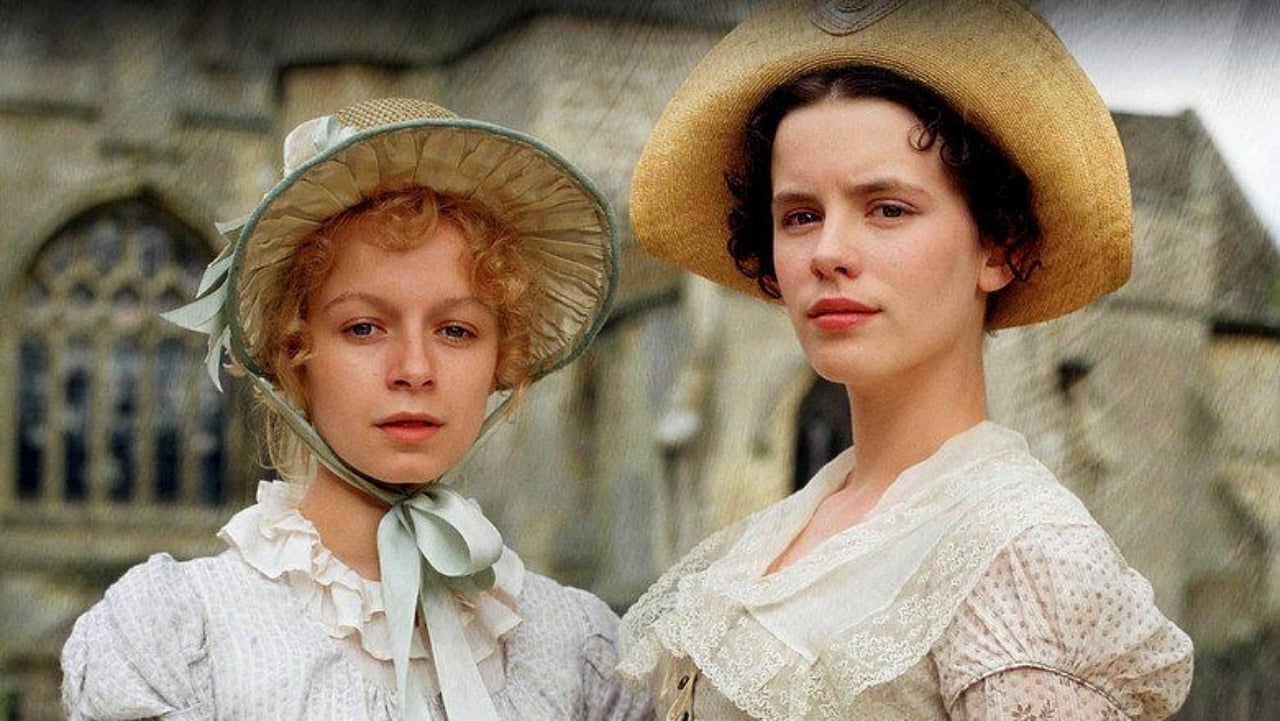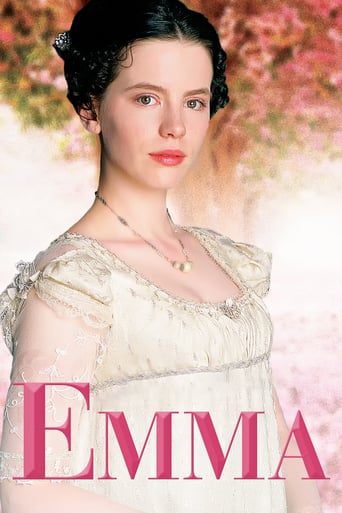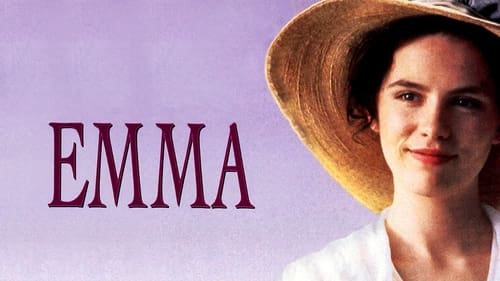Inclubabu
Plot so thin, it passes unnoticed.
Exoticalot
People are voting emotionally.
Numerootno
A story that's too fascinating to pass by...
KurotsutaMurasaki
I have known about this adaptation for a while, but I held off on watching it due to my apprehension at the idea of Mark Strong playing Mr. Knightley. I was concerned because when I watched this I had already seen him as Sir John Conroy in "The Young Victoria" and as Lord Blackwood in "Sherlock Holmes", both very unpleasant characters. But in my time there have been several instances of my expressing displeasure with casting choices only to eat my words when I actually saw the movie. So I entered into watching this with an impartial and optimistic outlook, sure that Mark Strong and Kate Beckinsale would surprise me with brilliant performances. And I would like to say that they did, but that would be an untruth.My Biggest fear about Mark playing Knightley was that his rebuking of Emma was going to be a watered down version of the 'RAAAWWWRR' that I was familiar with. And unfortunately, it was. Whenever Mark raises his voice, the right side of his face pulls up into a snarl. I'm sure it's unintentional, but I have seen that snarl before, and it does not belong on Mr. Knightley. As for Kate, her acting as Emma was also exactly what I feared it would be: a mere reiteration of Flora Poste, her character from "Cold Comfort Farm" - a girl who just carries on making everything go her way, and who emotes NOTHING. Oh, she said her lines, but there was nothing behind her cold dark eyes to make me believe that she felt what she said. What's more, I thought the hair styles and costumes suited her VERY ill.My sister found this intolerably boring. Only I determined to watch it to the end. The pacing is practically a paradox - it seems to drag on forever, despite the fact that several of things were rushed through. I've seen a lot of praise for how Kate and Mark portray Emma and Knightly to perfection etc. and I have no idea why because I didn't believe a word that passed between them. There are other acting and editing issues: After Mr. Elton is married, we never hear anything about how Emma has to help Harriet get over him. There is no appeal and no emotion; When Mr. Knightly says his "badly done" line at box hill (having just practically shoved Emma into the carriage) his voice breaks as though he's about to cry; Emma never really seems to be effected by being rebuked, because the next day when she goes to see Miss Bates it's almost as if the whole thing never happened.Olivia Williams was a passable Jane Fairfax, but much like Polly Walker's portrayal, Olivia failed to show the degree of Jane's distress. I found Raymond Coulthard's Frank Churchill adequate, but insignificant. Dominic Rowan was,admittedly, probably the most accurate Mr. Elton I've ever seen, but also the most unmemorable. As for Bernard Hepton as Mr. Woodhouse, I don't really care for him in the first place. The shining star for me in this version was Alistair Petrie as Robert Martin. I like him as an actor and I think he was the ideal choice for Harriet's Mr. Martin. He and Samantha Morton (Who was her usual fantastic self as Harriet Smith) played off of each other so well, even when the actors around them weren't giving them much to work with. I consider their scenes (Few as they are) to be a good reason to watch this at least once. I would probably think this a tolerably good adaptation were it not for some gargantuan elephants in the proverbial room. First is Mrs. Elton: Is she British? Is she Texan? Is she even of this world? What is with her ACCENT? Then of course there is that ludicrous harvest feast at the end of the movie. The whole concept for this scene was not at all Janely. I was under the impression that I was watching a Jane Austen adaptation, not "Far From the Madding Crowd". There were somethings that were written oddly, I found. And by "oddly", I mean "creepily"The first of these is Mr. Knightley's strawberry line. This is delivered as a voice over transition to the scene in question and is thusly portrayed as a formal invitation: "Mr. Knightly invites you to taste his strawberries, which are ripening fast." THAT was a... questionable way to word that if you ask me. In addition, that line in the book was not worded as such, and was NOT intended to be a formal invitation. It was said to Mrs. Elton and was first meant to be a joke. I quote "You had better explore Donwell then," replied Mr. Knightly. "That may be done without horse. Come eat my strawberries, they're ripening fast." 'If Mr. Knightly did not being seriously, he was obliged to proceed so...'Another of these is Mr. Knightly's proposal. I was feeling good about this scene... until he drops the "I held you in my arms when you were three weeks old" line, and I immediately felt uncomfortable. Maybe DON'T talk about how you held her when she was a baby after you just asked her to MARRY you. Lastly we have Frank Churchill praising his lovely Jane at the end of the movie. Which would be fine if we wasn't whispering in Emma's ear about how fine his dead aunt's jewels will look against Jane's skin. Can I just be the first to say "Ehehewgaugh" (shudders). It's just creepy. Frank does talk about how Mrs. Churchill's jewels will be given to Jane, but he says he means to have them reset in a head ornament that will look nice against her dark hair. Hair - Normal. Skin - weird.Really this has been a long review when three simple words would have sufficed. "Badly done indeed."
marspeach
This version of Emma weirdly came out in the same year as the Gwyneth Paltrow film. But other than being based on the same book, the two adaptations really have nothing in common. While the film version was all comedy and lightness, this TV version is really quite dark. I mean that both literally and figuratively. Maybe it's because of the poor video quality, but the picture is usually quite dark. This makes sense, I suppose, to have realistic candle light at night-time scenes. But the scenes in the day-time aren't that bright either.Andrew Davies, the screenwriter, chose to do something very different with this Emma. He focuses a lot on the class system, which was always there in the context of the book, but I thought it was a bit heavy-handed in this adaptation. All the underclass workers-servants, farmers, etc.- are clearly present in every scene, making the way of life for the privileged possible. They're even moving pillows for them to kneel on in the strawberry picking scene. Emma makes sure to tell Harriet that Mr. Knightley owns EVERYTHING in Donwell, and all the other people who live there are merely his tenants or servants. Robert Martin seems very resentful of Emma, like he knows she advised Harriet to refuse him. He glares at her when she drops Harriet off at the farm. It's a big deal at the end when Emma shakes hands with him. This class system was in the background in the book and I'm not fond of Davies' idea to play it up (but I did think Emma and Robert Martin shaking hands was a nice touch). It's just not what I want to see when I watch a Jane Austen adaptation.This is far from my favorite Emma adaptation. Aside from all the darkness, I wasn't fond of most of the cast. It was also very short and while I know things need to be condensed, it felt very rushed and the Crown Ball scene was poorly done, IMO. Harriet is dancing in the beginning, then Elton snubs her, then Mr. Knightley dances with her for less than a minute before walking away! Blink and you'll miss it. The ending scene was also rather weak- a harvest ball with Mr. Knightley making a speech to all his tenants (stressing again how many people depend on him) that he will still keep everything running smoothly even after he moves to Hartfield. Well, at least I can say that at least Andrew Davies didn't add any sexed up scenes.I was not a fan of Kate Beckinsale and Mark Strong as the leading characters. Beckinsale's Emma was too cold and Strong's Knightley was way too harsh. The one saving grace of the cast was the beautiful Olivia Williams as Jane Fairfax. She was sublime and elegant despite being dressed plainly.I do like this one better than the 1972 miniseries, but really, that's not saying much. It does have its fans though, and I can understand their point of view, even if I don't share it. If you hate the Gwyneth Paltrow version, in particular, you'll probably love this one.
James Hitchcock
Until the 1990s there had never been a film based upon Jane Austen's "Emma". Then two came along in the same year, 1996. Or, if you count 1995's "Clueless", which updates Austen's plot to a modern American high school, three in two years. The main character is Emma Woodhouse, a young lady from a well-to-do family in Regency England. She is, financially, considerably better off than most Austen heroines such as Elizabeth Bennett or Fanny Price, and has no need to find herself a wealthy husband. Instead, her main preoccupation seems to be finding husbands for her friends. She persuades her friend Harriet to turn down a proposal of marriage from a young farmer, Robert Martin, believing that Harriet should be setting her sights on the ambitious clergyman Mr Elton. This scheme goes disastrously wrong, however, as Elton has no interest in Harriet, but has fallen in love with Emma herself. The speed with which Emma rejects his proposal makes one wonder just why she was so keen to match her friend with a man she regards (with good reason) as an unsuitable marriage partner for herself. This being a Jane Austen plot, Emma turns out to be less of a committed spinster than she seems, and she too finds herself falling in love, leading to further complications. Today in 2008 Kate Beckinsale is a Hollywood star, but in 1996, despite being only a year younger, was not nearly as well-known internationally as Gwyneth Paltrow. She is, however, just as convincing as Austen's well-intentioned but often wrong-headed heroine. Beckinsale seems to have a gift for classical roles- she made a delightful Hero in Kenneth Branagh's version of "Much Ado about Nothing"- and I sometimes find myself wishing that Hollywood could have found more suitable roles for her rather than wasting her in turkeys like "Pearl Harbor" or "Underworld". I preferred Jeremy Northam to Mark Strong as Emma's love interest Mr Knightley, largely because he came closer to my own conception of the character as a gentlemanly, chivalrous older man, in some ways more of a father-figure to Emma than a lover. (His surname is probably meant to indicate his gentlemanly nature- nineteenth-century gentlemen liked to think of themselves as the modern equivalent of mediaeval knights with their elaborate codes of chivalry). Strong tends to downplay the question of the age difference (he is 37, she 21) and makes Knightley more of a passionate lover and less of a wise mentor than does Northam. Samantha Morton (another actress who would go on to bigger things) is perhaps closer to the Harriet of the novel than was Toni Collette.This was the more small-scale of the two versions, being made for television rather than the cinema, and the sets and costumes seem less lavish and there are fewer big names among the cast. Costume drama, however, is generally something that British television does well, and this version can certainly hold its own with the cinema version; both are entertaining and well-made versions of Austen's novel. 7/10
Roxanne7179
The script is nice.Though the casting is absolutely non-watchable.No style. the costumes do not look like some from the High Highbury society. Comparing Gwyneth Paltrow with Kate Beckinsale I can only say that Ms. Beckinsale speaks British English better than Ms. Paltrow, though in Ms. Paltrow's acting lies the very nature of Emma Woodhouse. Mr. Northam undoubtedly is the best Mr. Knightley of all versions, he is romantic and not at all sharp-looking and unfeeling like Mr. Knightley in the TV-version. P.S.The spectator cannot see at all Mr. Elton-Ms. Smith relationship's development as it was in the motion version, so one cannot understand where was all Emma's trying of make a Elton-Smith match (besides of the portrait).


